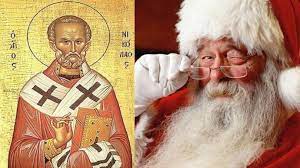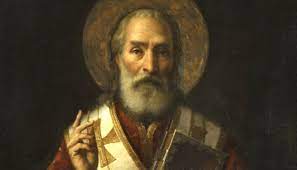The History of Saint Nicholas

December 19, 2022
St. Nicholas was born on March 15, 270 AD, in Patara Lycia, an area that is now present-day turkey. Nicholas was the son of a very wealthy family and lived a life of plenty; he was also associated with Christianity from a young age. Nicholas as a boy was very kind-hearted; he would share toys with his friends and be always generous and considerate with others, especially adults.
As a Young man, Nicholas lost both of his parents during an epidemic which greatly affected Nicholas, but he found purpose by helping the less fortunate and would eventually donate much of his inheritance to the poor and the ill. All of this made him very well-known and respected in the community. Nicholas continued to help the less fortunate alongside the church, which was more than willing to help Nicholas with his humble endeavor.
As Nicholas continued helping people alongside the church, he moved up the hierarchy within the church, becoming more and more respected. He eventually became so recognized by the church that they made him the bishop of Myra at the age of 30. St. Nicholas then started to feel more obligated to the people of Myra. Since he was now their bishop, Nicholas started improving their lives. Nicholas accomplished this through multiple endeavors, which ranged from improving the infrastructure of the buildings and roads of Myra to improving the medical support given to the people of Myra. Nicholas used the money that the church reserved for helping the people of Myra, which he now had access to because he was the bishop. Nicholas started to notice that people were very depressed during the winter months. Winter brought increased sickness along with a small supply of food. Nicholas, as the bishop of Myra, did not enjoy seeing his people unhappy, so he decided to come up with a small new tradition to do during winter, which would hopefully make people a little more happy during the winter months. This new tradition gave anonymous gifts to those needing them. He hoped people would perhaps give gifts to one another, putting them in a better mood during winter. Nicholas started this new tradition by handing out simple gifts to the poor, from food to straight-up cash.
For the majority of Nicholas’s gift-giving, he was anonymous with it. But since people had seen similar stuff from Nicholas, they quickly realized that he had given all the gifts. After seeing Nicholas give gifts to people and seeing how happy it made the poor, the people of Myra started to give small gifts to their family and friends to see if maybe it would help them during these hard times. And surprisingly, the gift-giving did help with the whole mood and joy of the people of Myra. The new gifting tradition spread fast across Myra and even further when someone gave a gift. The person who received the gift was more likely to give a gift to someone else, which allowed for this newly made gift-giving tradition to spread far and be adored by the public. The public appreciated this new tradition. Nicholas received a lot of praise for making this new tradition. Nicholas was worried about how the church would feel about this new tradition, though, since the church was not overly fond of new traditions created out of the blue. Initially, the church didn’t know what to think of the tradition. On the one hand, it was making people happy, but on the other hand, it was making the whole Christmas time more about giving gifts than celebrating Jesus’ birthday. But then the church started to see more people attending church because they were more in the Christmas spirit since the gift-giving had made everybody more festive and excited for Christmas. After seeing this, the church decided that gifting was a holy tradition since it was starting to make new people come to the church and have Christianity as their religion, making them, therefore, celebrate Jesus’s birthday as a Christian on Christmas. After hearing that both the public and the church accepted his tradition, Nicholas was overcome with happiness, and he would continue to help make his tradition thrive and help the needy for the next couple of years.
A few years later, the public greatly admired Nicholas, and the people adored him for his kindness. His gift-giving tradition has reached Europe and may soon go even further. Nicholas has continued to work alongside the church to help the poor and needy. Because of his kindness, people call him “the giver of good tidings” Nicholas has also shown to care very much for children by giving them many toys and treats as little gifts. Nicholas also stands in an influential position in the church since he has many influencers. Nicholas has been trying to help people from the Diocletian persecution, which has been targeting innocent Christians and has enforced unjust laws against them, causing severe punishment for believing and practicing their religion. Nicholas’s struggle against the Diocletian persecution has not gone unnoticed.
 The people leading this persecution saw Nicholas as an imminent threat to their persecution against the Christians because they believed Nicholas might rally his influencers against them and try to rally them to end their persecution. And because of this fear, they put a price on Nicholas to be captured, sending a group of their forces to attack Nicholas’s church. They captured Nicholas. He came with them willingly as long as they did not hurt anyone; the persecutors didn’t kill Nicholas, fearing Christians would take revenge and kill them. so they imprisoned Nicholas in a cell, where he stayed for the next seven years; where he kept his faith in God. While imprisoned, a new emperor took over after the Christians rebelled. This new emperor was a Christian himself, so he got rid of the persecutions of the Christians and helped make things right by helping the Christians rebuild what had been destroyed. Nicholas was soon released from prison by the emperor and given money as compensation for what he had been through. Nicholas then thanked the emperor for releasing him and helping the Christians, and after that, Nicholas returned to Myra and went back to his church, where he resumed being the bishop of Myra. Once word got around that Nicholas was alive, people gathered at his church to see him and praise him, and his name was chanted throughout all of Myra as a sort of welcome home to their beloved bishop. Nicholas gave all of his compensation money to the church and the poor.
The people leading this persecution saw Nicholas as an imminent threat to their persecution against the Christians because they believed Nicholas might rally his influencers against them and try to rally them to end their persecution. And because of this fear, they put a price on Nicholas to be captured, sending a group of their forces to attack Nicholas’s church. They captured Nicholas. He came with them willingly as long as they did not hurt anyone; the persecutors didn’t kill Nicholas, fearing Christians would take revenge and kill them. so they imprisoned Nicholas in a cell, where he stayed for the next seven years; where he kept his faith in God. While imprisoned, a new emperor took over after the Christians rebelled. This new emperor was a Christian himself, so he got rid of the persecutions of the Christians and helped make things right by helping the Christians rebuild what had been destroyed. Nicholas was soon released from prison by the emperor and given money as compensation for what he had been through. Nicholas then thanked the emperor for releasing him and helping the Christians, and after that, Nicholas returned to Myra and went back to his church, where he resumed being the bishop of Myra. Once word got around that Nicholas was alive, people gathered at his church to see him and praise him, and his name was chanted throughout all of Myra as a sort of welcome home to their beloved bishop. Nicholas gave all of his compensation money to the church and the poor.
Throughout the rest of his life, Nicholas helped rebuild Myra to its former glory, for the persecution had been long and dreadful, but the Christians were stronger now than ever. At the end of Nicholas’s life, he brought happiness and joy to the world and served as a beacon of hope to those in need. He had nearly fully helped rebuild Myra and brought peace back to Myra. Nicholas peacefully passed away on December 6, AD 343, and left a legacy that would never truly die. A while after Nicholas’s death, he became a saint and was the patron saint of merchants and children, and since he was now a saint, he would be remembered on December 6, the day he died, every year so that he would always be remembered and never forgotten.